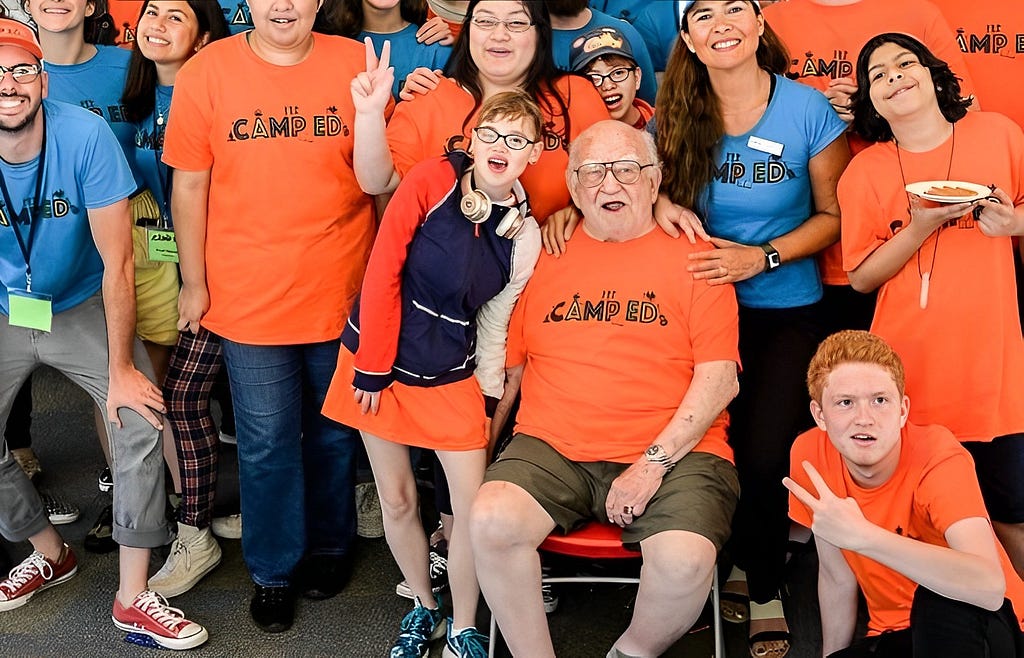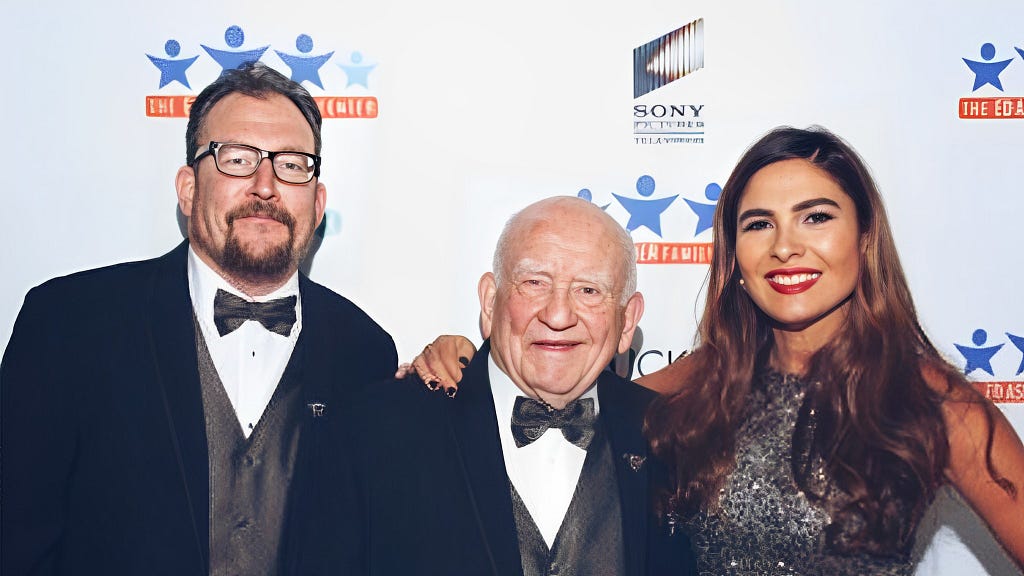High Impact Philanthropy: Matt Asner and Navah Paskowitz-Asner Of The Ed Asner Family Center On How To Leave A Lasting Legacy With A Successful & Effective Nonprofit Organization
An Interview with Karen Mangia
A drive to NEVER give up. When times get tough, you double down, put your head down, and PLOW ON. Creating a non-profit has been the hardest and yet one of the most fulfilling aspects of our lives!
For someone who wants to set aside money to establish a Philanthropic Foundation or Fund, what does it take to make sure your resources are being impactful and truly effective? In this interview series, called “How To Create Philanthropy That Leaves a Lasting Legacy” we are visiting with founders and leaders of Philanthropic Foundations, Charitable Organizations, and Non-Profit Organizations, to talk about the steps they took to create sustainable success.
As a part of this series, I had the pleasure of interviewing Matthew Asner and Navah Paskowitz-Asner.
Matthew Asner and Navah Paskowitz-Asner are special needs advocates and the co-founders of the non-profit, The Ed Asner Family Center. Created in 2018, The Ed Asner Family Center offers inclusive day camps, expressive arts, and vocational enrichment programs for all abilities, as well as health and wellness classes and low-cost mental health counseling and group counseling services to neurodivergent individuals, their families, and the local community. The son and daughter-in-law of acting legend, Ed Asner, Matt and Navah are parents to six kids, three of whom are on the autism spectrum, and have dedicated their lives to supporting neurodivergent individuals and their families. The annual Ed Asner & Friends Celebrity Poker Night will be held on June 3rd and all proceeds will benefit The Ed Asner Family Center.
Thank you for making time to visit with us about a ‘top of mind’ topic. Our readers would like to get to know you a bit better. Can you please tell us about one or two life experiences that most shaped who you are today?
Matt Asner: I was diagnosed with a learning disability when I was 13. This followed years of frustration and confidence destroying failure in classrooms in Los Angeles. The people I met and the confidence-building work that I did leading up to high school prepared me for the work we are doing now at The Ed Asner Family Center and also prepared me for my role as the father of sons with special needs.
Navah Paskowitz-Asner: I think the unique way I was raised, with eight brothers in a camper traveling all over the world, definitely shaped who I am today. My family started the first-ever surf instruction camp where my doctor father took us around from Native American reservation to Native American reservation, helping people and supporting my mom’s heritage (she is almost full native). I am uniquely suited for the life of a special needs leader/mother of many. I have experienced so much chaos that my life now is just typical to me!
You are successful leaders. Which three character traits do you think were most instrumental to your success? We would love to hear a few stories or examples.
Hope, emotional intelligence, and a mutual passion to improve the lives of our Autistic children are all important character traits that have helped our success with the Center.
What’s the most interesting discovery you’ve made since you started leading your organization?
We would say the most interesting discovery we made is the incredible untapped potential of autistic individuals and employees. Over 80% of individuals with cognitive difficulty are unemployed or underemployed. We strive to hire autistic individuals to help co-create and co-run nearly all of our programs.
Can you please tell our readers more about how you or your organization intends to make a significant social impact?
Producing and fostering self-confidence in the individuals that we serve is everything. Most autistic individuals have grown up in a world of no’s and impossibles. At the Center, we believe in the world of possibilities.
What makes you feel passionate about this cause more than any other?
MA: We wanted to create opportunities for our own children and, by doing that, all special needs children in our community. Navah was a single mom who felt helping the foundation of the family was paramount, so we started with mental health services and all other programs just kind of organically fell into place.
Without naming names, could you share a story about an individual who benefitted from your initiatives?
NPA: We’ve had a wonderful success story with a single mom who had been through chemotherapy for cancer, and was really having a tough time financially and personally. Her daughter has benefited greatly from the center and has really grown up here in the last six years. She has been in nearly all of our programs as a full scholarship student for camps and social clubs and she just completed our very first adult day program. Her mom has said numerous times how finding the Center was like finding a family and home away from home.
We all want to help and to live a life of purpose. What are three actions anyone could take to help address the root cause of the problem you’re trying to solve?
- VOLUNTEERING. Getting out there and helping or donating your time is always so important.
- Being a BUDDY, FRIEND, or MENTOR to a special needs individual. Many of our young adults at the Center struggle to find friends and would benefit greatly from this kind of support. In all, just being there for them and listening to them helps.
- ALWAYS ASSUME INTELLIGENCE. When you respect the individuals in the community that you serve, they know that you are someone they can trust. We have always kept that in our hearts and minds when we meet special needs individuals. We hope more people will follow suit.

Based on your experience, what are the “5 Things You Need To Create A Successful & Effective Nonprofit That Leaves A Lasting Legacy?”
1. Hope and giving hope. We believe that there is no greater commerce than hope. It is probably the most valuable thing in any of our lives. We would venture to say that anyone that is volunteering or donating to assist you in helping people will see the work you are doing in their faces. So making sure that your outcomes are easily translatable and visual is essential.
2. The Team. Having a great team that is passionate about the cause and that can become future leaders for your organization ensures that many can reap the benefits of your non-profit for years to come.
3. A great and dedicated board of directors.
4. A community around you that supports you. One of the reasons why we chose our location in Reseda is the proximity to the university having a built-in community of artists, writers, and creative people. The surrounding community is one of our biggest assets.
5. A drive to NEVER give up. When times get tough, you double down, put your head down, and PLOW ON. Creating a non-profit has been the hardest and yet one of the most fulfilling aspects of our lives!
How has the pandemic changed your definition of success?
The pandemic taught us that we must constantly be ready to change with the times and people’s changing needs. We adapted by moving all of our content online and most importantly in those hard and unprecedented times, we only offered free programs. We also needed to ask ourselves, “How do we reach people that haven’t walked through our doors?” This question led us to make quick decisions with this as our main theme. Now that we’re back in person, we continue to live and operate under this rule to this day. It has helped us immeasurably.
How do you get inspired after an inevitable setback?
Through learning comes inspiration. When roadblocks or setbacks happen, it produces new challenges that force you to think on your feet. This very action creates inspiration.
We are very blessed that very prominent leaders read this column. Is there a person in the world who you would like to talk to, to share the idea behind your non-profit? He, she, or they might just see this, especially if we tag them. 🙂
MA: My wife would say Pedro Pascal!
You’re doing important work. How can our readers follow your progress online?
They can find us on all social media and our website, www.teafc.org.
Thank you for a meaningful conversation. We wish you continued success with your mission.
About The Interviewer: Karen Mangia is one of the most sought-after keynote speakers in the world, sharing her thought leadership with over 10,000 organizations during the course of her career. As Vice President of Customer and Market Insights at Salesforce, she helps individuals and organizations define, design and deliver the future. Discover her proven strategies to access your own success in her fourth book Success from Anywhere and by connecting with her on LinkedIn and Twitter.
High Impact Philanthropy: Matt Asner and Navah Paskowitz-Asner Of The Ed Asner Family Center On How… was originally published in Authority Magazine on Medium, where people are continuing the conversation by highlighting and responding to this story.
